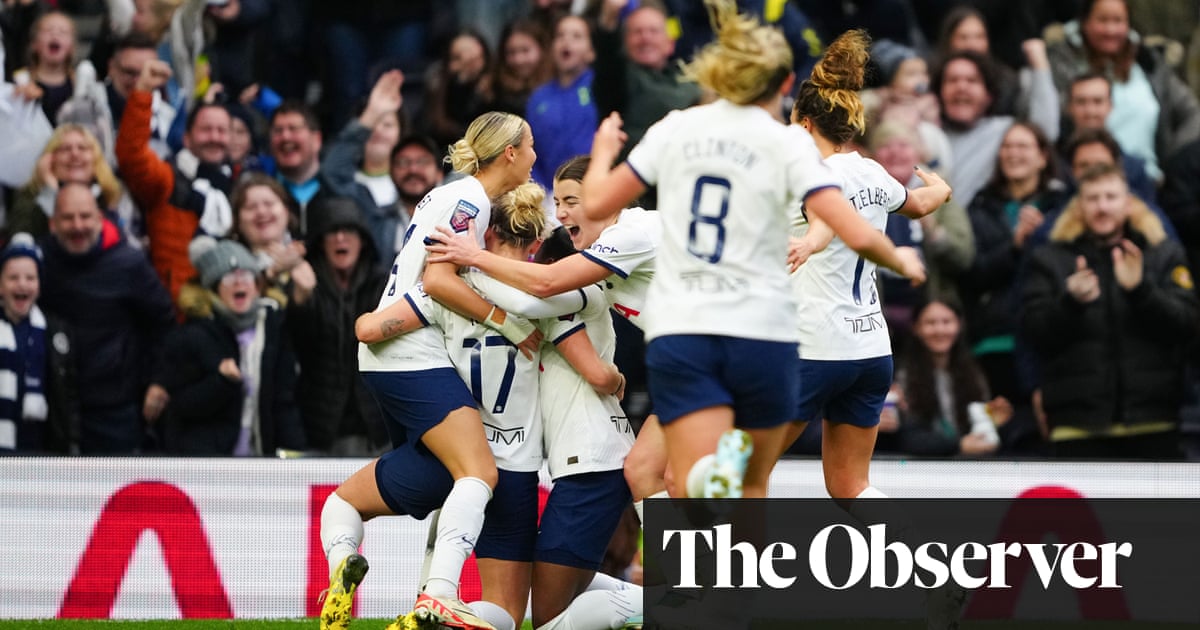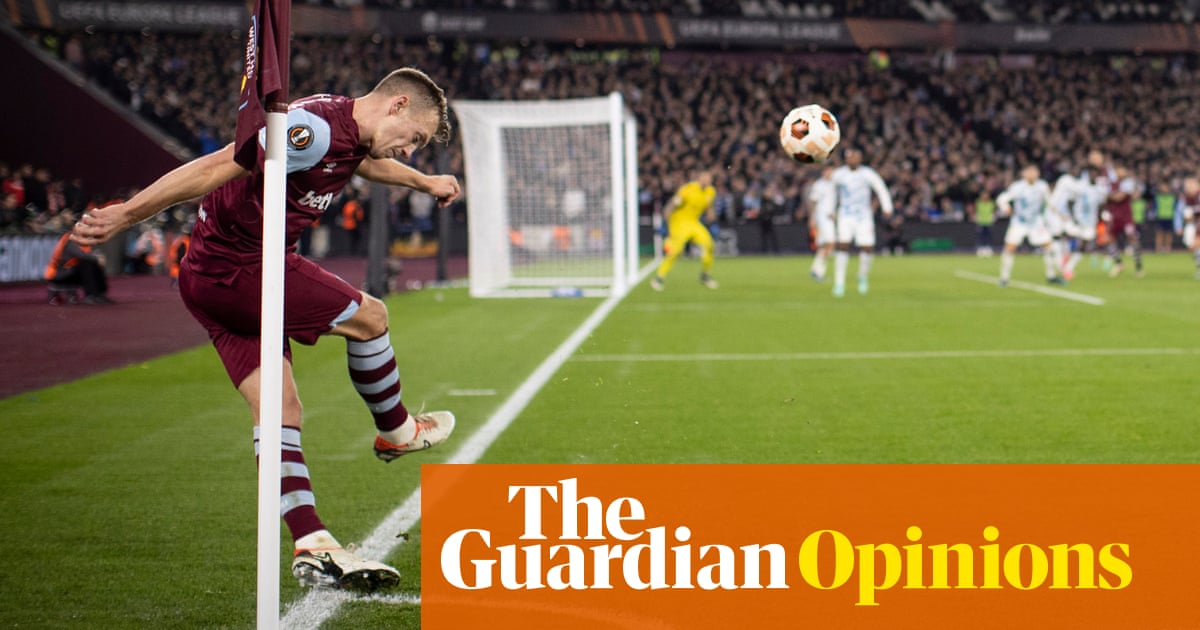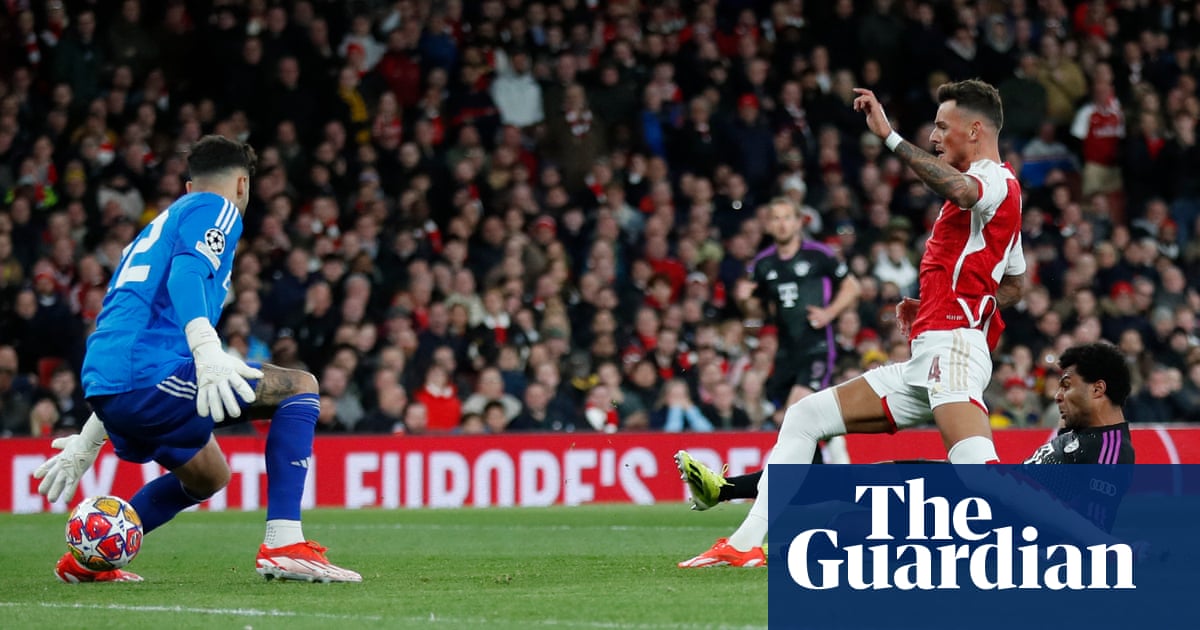
Ange Postecoglou isn’t worried about set pieces, as he has made clear repeatedly over the past few weeks. Football being football, the more he is asked and the more he plays down their importance, the more goals Spurs seem to concede from set pieces. At the same time, as Arsenal score more and more from set pieces, their set-piece coach, Nicolas Jover, has become an increasingly prominent figure, bouncing up from the bench every time Arsenal are awarded a corner or free-kick near the box.
Set pieces feel like the new frontier. It may look familiar as Declan Rice bends one in, Ben White checks the keeper and a phalanx of big blokes charge to the near post, but the blocking runs are more carefully plotted that ever before.
Data analysis means that set plays are becoming more and more sophisticated. Google DeepMind, which has previously looked at board games such as Go, has worked in collaboration with Liverpool to demonstrate how artificial intelligence can improve positioning at corners.
But there’s an assumption here that Postecoglou seems not to share, which is that set plays are somehow separate from the rest of the game. That’s why DeepMind has begun looking at football with corners. There is a fixed point from which the ball will be delivered: far fewer variables than from open play.
Before the 2018 World Cup, Gareth Southgate realised that practising set pieces was efficient: relatively large gains for a relatively small amount of work. The result was England’s best World Cup since 1990, based largely on Harry Maguire and John Stones being good in the air, and Kieran Trippier’s delivery.
Countless managers over the years have come to a similar conclusion: good balls into the box plus big lads plus organisation equals a threat, no matter what differential of ability there might be in other areas of the game.
Postecoglou seems not to share that view. In the wake of defeat in the north London derby, when all three of the goals Tottenham conceded came from corners – two of Arsenal’s and one of their own – he pointed out that his sides have often initially struggled to defend set plays but have then improved. “There is an underlying reason for that which I’m very, very comfortable with,” he said. “Eventually I will create a team that has success and it won’t be because of working on set pieces.”
His vision, seemingly, is holistic: he sees set pieces as part of a wider whole, not a discrete part of the game. In one sense, Postecoglou is right: going into the weekend Spurs had conceded 14 goals from set plays this season. In terms of goals conceded, only Nottingham Forest have a higher proportion coming from set plays. Even if that figure could be halved, which would represent remarkable success, it’s not going to close the gap to Manchester City or Arsenal. If Spurs are to bridge to the league’s elite, it will be by improving coherence and consistency in more general play, which almost certainly demands some strengthening of the squad.
More contentious is the implication that improvements elsewhere will bring improvement to the defending of corners – although they may reduce the number of corners conceded which would, clearly, be a major help. Certainly that’s not how the numerous clubs who now employ set-piece specialists see it.
But then this has been an underlying issue almost since coaching began: having broken the game down into component elements that can be practised, how do you put it back together again to make it relevant for the fluent whole? Football is the most fluid of all major ball sports, the one with the fewest fixed points and the longest passages between breakdowns, and that makes it difficult to analyse and predict and thus to practise.
That’s what periodisation, the theory pioneered by Vítor Frade, a huge influence over José Mourinho and a whole generation of Portuguese coaches, sets out to address. From the most basic point of view, if Tottenham had conceded not 14 goals from set plays but 10, if they’d scored three or four more than the 11 they have managed, that might have been enough to pull them level with Aston Villa.
Jover was an assistant coach to Thomas Frank at Brentford when he joined Manchester City as a set-piece specialist in 2019. That in itself is telling; when Pep Guardiola was at Barcelona, with a team largely comprising diminutive technicians, corners tended to be an opportunity to recycle the ball into midfield to create an opportunity for the practised moves in which they specialised, a sort of open-play set piece. Nobody was slinging in crosses for Gerard Piqué and Sergio Busquets to attack.
As Guardiola evolved and adapted, he decided set pieces were worth working on separately. Jover’s impact was immediate: in his first season at the Etihad, City scored more goals from set plays than any other side in the league and conceded the second fewest. But what is perhaps most significant is Guardiola’s shift of mentality, that he had come to see set plays as part of the game worth practising and treating differently.
Arteta was clearly impressed, and persuaded Jover to join Arsenal in 2021 when Andreas Georgson returned to Malmö. The season before Jover arrived, Arsenal scored six goals from set plays (penalties excluded); under him they have scored 16, 15 and, this season so far, 22. Goals conceded from set plays have remained largely unchanged at around six.
This season, Arsenal have a net gain from set plays of 16. That’s only two more than City – not huge, although when the title race could go down to goal difference, it’s not irrelevant either.
Tottenham, meanwhile, have conceded three more than they have scored this season from set plays. Set plays alone, in other words, account for 19 of the difference of 49 between Arsenal’s and Tottenham’s goal difference.
Postecoglou is right that an improvement in set plays alone would not be enough to elevate Tottenham into the elite, but equally set plays do account for around 40% of the gap; the bigger issue, though, is whether he is right that when general play improves, set plays will necessarily improve with it.
Arteta clearly believed his side needed extra help in that area. So far, his belief in the value of specialism is being rewarded.












